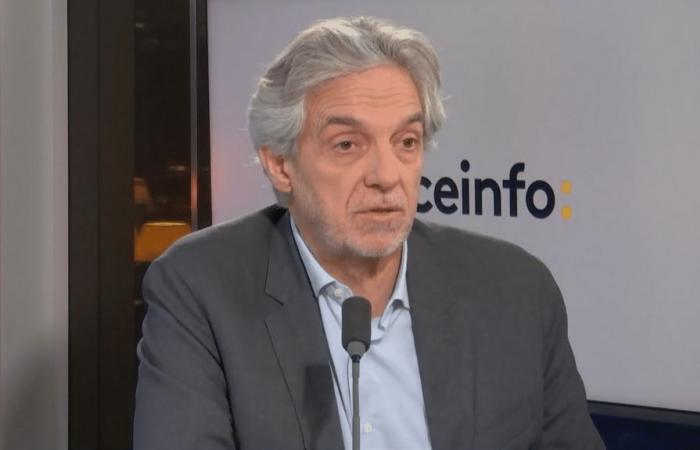
Amid the significant difficulties in the industrial sector, in terms of energy prices and regulations around decarbonization, Brussels must focus on a “priority”according to Alexandre Saubot, president of France Industrie, it is “produce more in Europe”. “It will be good for activity, it will be good for sovereignty, it will be good for employment” and due to its already the most virtuous industry in the world, “it will be good for the planet”.
Likewise, in France, he deplores measures like “the reduction of the research tax credit” or “the capping of reductions in charges” which are very unfavorable measures for the industry, according to him, and which do not favor investment in France. He therefore expects decisions from the government and Parliament that preserve the attractiveness of the country.
franceinfo: The agreement obtained includes two measures from which the government expects a lot, and in particular this contract to promote experience to facilitate the hiring of the oldest unemployed, where the employee can be automatically retired as soon as he will be entitled to a full pension. Are you encouraging bosses, particularly those in industry, to take advantage of it?
Alexandre Saubot : We encourage industry bosses to take advantage of all the tools that allow them to maintain skills and keep seniors working, at a time when we have formidable challenges in terms of recruitment and career development. And then it will also involve an evolution of mentalities in relation to practices that may have taken place in the past.
“Today, we have a collective responsibility which is to increase the employment rate, including for seniors.”
Alexandre Saubot, president of France Industrieat franceinfo
There was the pension reform and the increase in the age which increases the range of possibilities and which goes in the right direction. There is the reform of the senior sector of unemployment insurance, which reduces the incentives for people to separate, and all the tools, including this contract, should allow us to further improve the employment rate of seniors. Afterwards, you have to accept that it takes time. People need to take advantage of all these new tools. In addition, the economy is not in one of its best times. You shouldn't expect things to change in six months.
It still takes up the idea of the senior permanent contract which was supported by Medef. For its part, the CGT says that this is not a social advance and speaks of “senior fixed-term contracts”.
It’s aimed at people who were unemployed, so we’ll see. Once again, you should not imagine things before seeing how the market reacts. We are targeting people who were unemployed and who probably without this tool would not have – or would have had difficulty – returned to the job market. So it can only be a “plus”. Afterwards, we will see the quantities, the type of profile, the duration of the contracts, and whether it takes people well until they can assert their right to retirement. All of these elements will need to be evaluated over time. But faced with the objective of skills, of increasing the employment rate of seniors – like other age categories, but this one is very important – to give ourselves an additional tool and agree to see how it works, I think that it is first of all a sign of responsibility of the social partners. We should be happy about it.
After removing 1 254 positions at Michelin ten days ago, the Minister of Industry Marc Ferracci did not hide his concern for the future. Announcements, site closures, there will be “probably in the weeks and months to come”, according to the minister. Is this your feeling too? Will there be other social plans in the industry?
First, the economic situation is less good. We can clearly see that globally, things are slowing down. Secondly, Europe faces significant difficulties in terms of energy prices, in terms of over-regulation, in terms of decisions that have very big impacts. I am obviously thinking of the automobile sector and the banning of the thermal engine in 2035.
“Everyone has known for a long time that these decisions will have negative consequences for employment.”
Alexandre Saubot, president of France Industrieat franceinfo
Now what you need to look at is not just the short term movement, it's the trend.
Which sectors do you have particular concerns about?
The automobile is very clear. Beyond chemicals, there are all sectors that are impacted by the consequences of the crisis in Ukraine and the gap in energy prices between Europe and the rest of the world. And then there are all the sectors which will be strongly impacted by the increase in Chinese competitive intensity. Chinese overcapacity, today with the customs duties in the United States, is flowing massively into Europe and also poses risks and difficult consequences to many sectors.
Michelin boss Florent Menegaux justifies the closures of Cholet and Vannes by saying that Europe is no longer competitive, with excessive regulation and uncompetitive energy costs. Are you saying the same thing?
I say that we must listen to Florent Menegaux, who is a committed, responsible boss, attached to his country. And I think he made this decision because there were no other options left, after looking at many other solutions. And I think our friends in Brussels would do well to listen to a competent, emblematic and responsible boss:
“Brussels must make decisions which give Europe a chance to remain a beautiful land of industry.”
Alexandre Saubot, president of France Industrieat franceinfo
What type of decisions do you expect from Europe?
In the short term, we have a very heavy subject, it is the implementation of the CSRD, the regulation on extra-financial reporting, which imposes a disproportionate administrative burden compared to the objective, which is to better measure carbon emissions. We are going to be the only region in the world that is capable of setting this level of obligation to deal with this subject. Everyone recognizes it as important, but the tools we are asked to implement are disproportionately expensive. We are talking about billions of euros which will be spent on audit and consulting firms to justify all the elements. The money would be better invested in real decarbonization projects. In a company like the one I run, it is better to invest in a project to transform the propulsion of a machine, than to produce a report that no one will read because it is useful – in 90% of what is expected – to nothing.
At the same time, what do you fear most with the arrival of Donald Trump in the White House? Is it no longer being able to export with the implementation of prohibitive customs tariffs, or is it seeing American energy becoming more and more competitive and an industry in Europe less and less competitive?
“I may surprise you, but I think that the arrival of Donald Trump in power is an opportunity for Europe.”
Alexandre Saubot, president of France Industrieat franceinfo
This is an opportunity because as he is very direct, as he raised a certain number of issues on America First, he will perhaps help the Europeans to realize that we too must do proof of capacity to protect itself, of determining the costs of economic sectors to respond to the formidable challenge, which is the relaunch of economic war and the end of happy globalization. If the arrival of Donald Trump and his somewhat direct side helps wake up Europe, I think it will ultimately be very good news.
And how can Europe react? What does it go through?
I think that it first of all involves very simply the fact that Europe has a priority, which is to produce on European soil. And that we evaluate all the obligations – all the regulations, all the constraints that are imposed – in the light of: will this promote production on European soil or not?
Knowing that the United States is France's fourth customer, if tomorrow we cannot export our aeronautics, our pharmacy or our wines and spirits, what is the point of producing them?
But we will continue to export them. Simply, they will perhaps be taxed a little more than in the past. There were already customs duties for many things that were exported to the United States and we are going to have a discussion with the American administration.
“I think that today, the subject is not primarily European customs duties, it is the priority that Europe must give itself around producing in Europe.”
Alexandre Saubot, president of France Industrieat franceinfo
Europe is the most regulated area, the most virtuous in terms of the environment, so everything that is produced in Europe emits less carbon than if it is produced elsewhere. So the best way to save the planet is to produce more in Europe and within Europe, it is to produce more in France. Our Brussels bureaucrats and all the people who make decisions there must realize that the priority must be: let's create the conditions so that we produce more in Europe. And it will save the planet. It will be good for activity, it will be good for sovereignty, it will be good for employment.
In France, we are in the middle of a tax debate with the finance bill arriving in the Senate. How do you look at this, you who are at the head of France Industrie? Alexandre Bompard, boss of Carrefour, speaks of confiscatory taxation with the implementation in particular of this exceptional contribution. What do you say about it?
I think you have to know what you want. We must restore public finances and we must preserve the attractiveness of the territory. So today, we see a desire to restore public finances. We do not really see the desire to preserve the attractiveness of the territory and the measures currently envisaged on the reduction of the research tax credit, on the capping of reductions in charges with measures very unfavorable to the industry, are signals which, in my opinion, will worry all people who were thinking about making investments in France. So the government and Parliament must, as quickly as possible, take decisions that preserve the attractiveness of France.
The research tax credit costs 7 billion euros per year. Are you calling for a reconsideration of this idea of planing it?
These 7 billion euros make it possible to promote innovation, the attractiveness of the territory, to hire researchers, it is not an expense. What we need is for people at Bercy to understand that the research tax credit is not an expense, it is an investment to allow France to be more innovative and it is our future. . The industry has a future through innovation. Decarbonization has a future through innovation. And it's the same thing with reductions in charges. We cannot target the effort requested on the industry which, everyone knows, has a major competitiveness problem. We will work on all the other subjects. I think about the attractiveness of the professions. We have Industry Week which starts next Monday. There are 7000 events. It will be an opportunity to open the door to the factory next door, to see our fantastic jobs. The government and Parliament must not make our lives excessively complicated, otherwise we will all regret it in three or five years.





